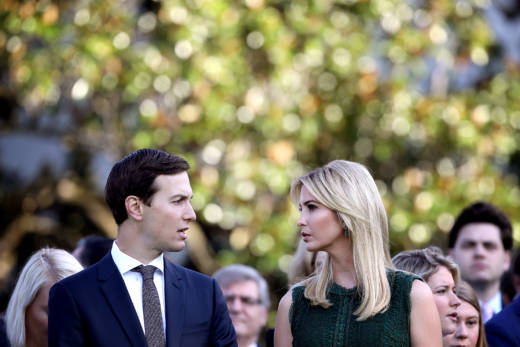Among other requirements, the law requires top administration officials to save all of their communications and forward official correspondence from their personal emails to their official accounts within 20 days.
Last week, Politico reported that Trump adviser and son-in-law Jared Kushner used a private email account to communicate with other government officials.
The New York Times has reported that along with Kushner, former White House strategist Stephen Bannon, former Chief of Staff Reince Priebus, economic adviser Gary Cohn and policy adviser Stephen Miller occasionally used private email addresses to discuss White House matters.
And Newsweek has reported that Trump's daughter, Ivanka, who is Kushner's wife and has an official advisory role, used a personal email address to communicate with a government official.
DeSaulnier says if those reports are true, the letter the White House sent to the oversight committee in April was both untruthful and a violation of the law.
"We were told by the White House on April 11 -- the committee was told -- 'There are no senior officials covered by the Presidential Records Act with multiple accounts,' which is a lie," DeSaulnier said in an interview.
"If these newspaper reports are true that not only were they lying to the public during the campaign, but after the administration was sworn in, they misled, which is a nicer way of saying lied to, the Republican chair of the oversight committee," DeSaulnier said in an interview.
At issue are these terms used to describe email accounts in the letters between the committee and the White House: alias, multiple and personal.
In the letter from the White House, Marc Short, assistant to the president and director of legislative affairs, wrote that the White House interprets the phrase "alias" email accounts, one of the terms used in the oversight panel's letters, to mean "multiple" email accounts.
"There are no senior officials covered by the PRA (Presidential Records Act) with multiple accounts," Short wrote.
But Short did not say whether those emails were connected to the personal accounts of senior administration officials, notes Kathleen Clark, a law professor at Washington University in St. Louis who specializes in national security and government ethics.
"The White House in April did not address personal email," Clark said in an interview after reading the correspondence between the committee and the White House.
"I look at the White House response and I don't see a lie," Clark said. But, she said, the White House's letter may have misled the committee.
The confusion may soon get sorted out.
Last week the oversight panel's chairman, South Carolina Rep. Trey Gowdy, and the committee's top Democrat, Maryland Rep. Elijah Cummings, sent letters to the White House and two dozen federal agencies, calling for information about the private email use by senior officials. The committee's leaders are giving the Trump administration until Oct. 9 to respond.
If the White House doesn't provide the committee with answers or if any of their private emails used to conduct public business are not preserved, some of the people closest to the president will be held accountable, DeSaulnier said. He added that the panel would subpoena the White House to hand over documents if necessary.
"There would be very severe consequences, including personal consequences, for people who do this," DeSaulnier said.
The recent email disclosures come amid House, Senate and special counsel investigations into Russia's interference in the 2016 election and its potential ties to the Trump campaign.
"It makes you concerned that they are using these private emails to avoid scrutiny of those investigations," DeSaulnier said.
A White House spokeswoman did not respond to requests for comment about DeSaulnier's concerns.
But last week, the White House clarified its email policy.
"All White House personnel have been instructed to use official email to conduct all government-work," Press Secretary Sarah Huckabee Sanders said. "They are further instructed that if they receive work-related communication on personal accounts, they should be forwarded to official email accounts."
